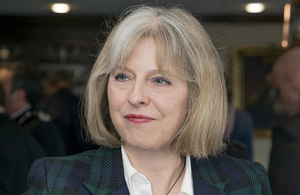Historic law to end Modern Slavery passed
A landmark Bill to help eradicate modern slavery received Royal Assent today (Thursday 26th March).

Home Secretary
The Modern Slavery Act 2015 is the first of its kind in Europe, and one of the first in the world, to specifically address slavery and trafficking in the 21st century.
The new legislation significantly enhances support and protection for victims, gives law enforcement the tools they need to target today’s slave drivers, ensures perpetrators can be severely punished, and includes a world leading provision to encourage business to take action to ensure their end-to-end supply chains are slavery free.
Having undergone extensive Parliamentary and public scrutiny, the Modern Slavery Act is one of the final pieces of legislation to be put on the statute books by this government.
Home Secretary Theresa May said:
The presence of modern slavery in today’s society is an affront to the dignity and humanity of every one of us. The Modern Slavery Act 2015 is an historic milestone.
This landmark legislation sends the strongest possible signal to criminals that if you are involved in this vile trade you will be arrested, you will be prosecuted and you will be locked up. And it says to victims, you are not alone - we are here to help you.
I want to pay tribute to the campaigners, organisations, and Parliamentarians of all parties for their hard work and determination to shine a light on this hidden crime and for helping to shape this law.
Our work is far from over, and everyone in all sectors of society must play their part. But we as a nation can be proud that today we are closer to consigning slavery to the history books where it belongs.
The Act will strengthen the response of law enforcement and the courts by:
- Increasing the maximum sentence available for the most serious offenders from 14 years to life imprisonment;
- Ensuring that perpetrators convicted of slavery or trafficking face the toughest asset confiscation regime;
- Consolidating and simplifying existing modern slavery offences into one Act;
- Introducing Slavery and Trafficking Prevention Orders and Slavery and Trafficking Risk Orders to restrict the activity of individuals where they pose a risk of causing harm; and
- Strengthening law enforcement powers at sea to close loopholes which can prevent the police and Border Force being able to act on board vessels at sea.
The Modern Slavery Act 2015 will ensure victims receive the protection and support they deserve by:
- Creating a statutory defence for victims of modern slavery so that they are not inappropriately criminalised;
- Giving the courts new powers to order perpetrators of slavery and trafficking to pay Reparation Orders to their victims;
- Providing for child advocates to support child victims of trafficking;
- Extending special measures so that all victims of modern slavery can be supported through the criminal justice process;
- Providing statutory guidance on victim identification and victim services, including an enabling power to put the relevant processes on a statutory basis; and
- Introducing protections for victims of abuse on an overseas domestic workers visa.
The Act also establishes the UK’s first ever Independent Anti-slavery Commissioner to drive forward the law enforcement response and hold them to account at all levels, ensuring that the perpetrators are caught and prosecuted and that the victims are swiftly identified so they can get help.
The newly appointed Independent Anti-Slavery Commissioner, Kevin Hyland OBE said:
Through the passing of the Modern Slavery Act the UK has the opportunity to once again lead the fight against this cruel trade in human life. But we must be clear that this is just the first step. My role has been created to spearhead the UK’s response both domestically and internationally and to ensure agencies use the new legislation to its full potential, whilst crucially also calling to account those that fail to deliver.
I will be working in close partnership with statutory bodies and civil society groups to both strengthen efforts to pursue and prosecute traffickers and slave drivers and to ensure that the needs of victims are met in all circumstances. A key focus must also be on more effective measures to prevent these crimes from ever occurring in the first place. I aim to achieve this through working closely with communities across the UK as well driving more intelligent upstream activity in the source countries from where large numbers of women, men and children are trafficked to this country.
Modern slavery is a complex problem and legislation is only part of the solution. Alongside the passage of the Bill, the government published a Modern Slavery Strategy outlining a comprehensive response to the crime. This includes efforts across government and law enforcement, work with other countries to tackle the problem at source, and increased awareness within all communities.
Today’s move comes as the government announces that The Salvation Army has been appointed to continue the provision of the government’s Victim Care Contract to manage the support of adult victims of modern slavery in England and Wales.